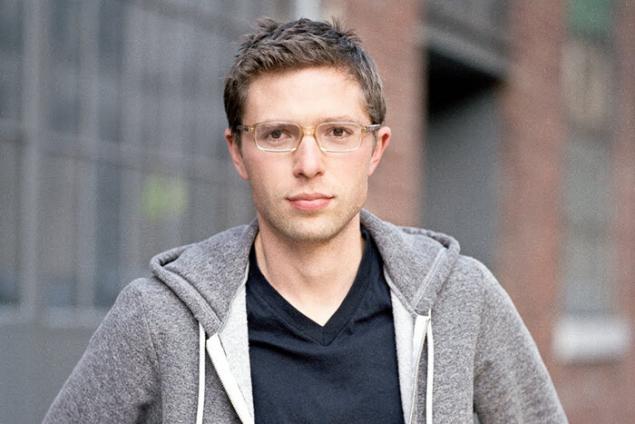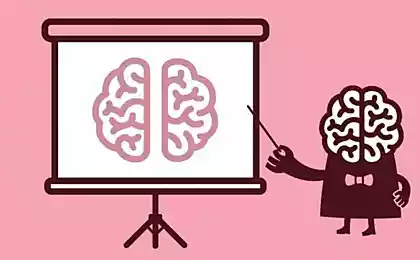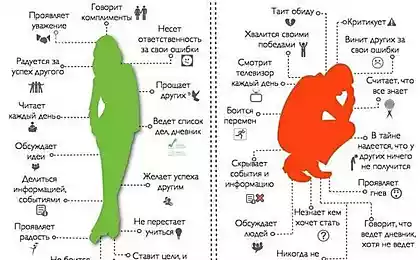624
Jonah Lehrer: Thoughts seem metaphysical, but they are physically change our brain
The Wired columnist and science popularizer Jonah Lehrer is one of those scholars that explore the relationship and an accurate cognitive Sciences. The questions he is, look like this: what color can double the creative potential of employees? Why "brainstorming" is not only not help, but hinder to invent? How cities hinder us to think? All this researcher told in Moscow at the Festival of world ideas "Around the world".

© Nina Subin
The man was difficult to read large amounts of text. This is related more to the fact that there have been some changes in thinking associated with the development of Internet technologies, or the fact that the available information in General has become more?
— There is not much evidence that because of the emergence of a large number of distractions to the modern person has become more difficult to read novels. On the Internet there are many opportunities to become smarter and not just stupid. The Internet gives us new sources of information, new sites, connections and interactions, allows us to develop our thinking. He have good traits and bad. The most important is to understand what hampers our efforts to work, distracts us, and focus on developing those skills that will have the best. The Internet shows us new ideas, opens access to new information.
In addition, you need to understand that the brain is changeable. Many say that the Internet affects our brain. But everything affects the brain! Even the reading skills to radically change our brains: a third of the visual cortex devoted to the reading and writing, letters and words, one-sixth of our brain is responsible only for reading. It's a compromise, the distribution of power — if you have a well developed skill of reading, for example, you will never have the same good results in the field of visual memory. Not to say that reading is bad, it just allows you to do some things better and some worse. I think the same applies to the Internet, it's like a set of pros and cons. You need to understand the pros and focus on them, try to mitigate the negative side, to balance the cons.
— We know that today, a person becomes difficult to focus on reading, after reading two or three pages, his attention begins to dissipate. Is it good or bad? How do we turn off the distractions?
It is one of the negative features of the Internet. I have my own way to concentrate at work: I leave the cell phone at home, disable Wi-Fi. I lack self-control: if Facebook is not turned off, I continue to follow the updates of the tape. But each person must find his own method, I think. Like many other things, this approach takes practice, gradual improvement.
In my speech I told about the experiment called "the Marshmallow test". Four kids try to resist the urge to eat marshmallows at the moment, in the long run to get a double portion. The study showed that if you give the child to practice, he can learn to restrain myself in the desire to eat the marshmallow and give the best results. All this applies to adult. We are better able to learn when to ignore distractions. Unlike animals we can control our thoughts, many species are not able to focus or follow directional light, but we can choose what to pay attention to, and what not, to seek benefits. This skill is a huge gift that people should be able to use.
How can you explain to the student why he needs to memorize huge amounts of information, which he may at any time see on the Internet?
— An interesting question. I would say something like: "Son, if you want to find some new idea, you need to have a huge store of old ideas in your head."
"But I can find all these old ideas and the Internet," he said.
Our mind works like an associative machine which always gives rise to new associations, new connections that do not come from nowhere. It is impossible to come up with a new idea, a new scheme without knowledge of the past experience. One of the important components of education is filling your mind with many existing concepts, ideas, facts. Creativity really requires knowledge. When a person wants to create something new, to invent the next iPhone, to solve some scientific problem, he can't just put a book under your pillow and sleep on it, he could study her.
— Then, it is necessary that the student memorize the conclusions, the main points of these concepts, and it is not necessary to make him learn the whole book by heart, as they do still in our schools.
— Right. This is what is called memorization — memorization. Too much focus on the schools. In my opinion, memorization played an important role some 50 years ago, but today, when everything can be found using the phone, the information is always in your pocket. However, one should not go too far — the person needs to keep certain information in my head. I would highlight the important role that information plays for creativity.
— How to change the education system — in General in connection with the changes which happen in our minds?
Books that are recommended by Jonah Lehrer:Daniel Kahneman has a new book called “Thinking fast and slow”. This is one of the most influential psychologists of the XXI century".
The first greatest book on psychology, it is almost a hundred years. It's amazing how in many ways he was right, how prophetic was this book. It is useful to read it not only from a historical point of view: there you can also find a large number of interesting hypotheses which are still not found scientific confirmation.
"Lighthouse" is an old novel by Virginia Woolf. She did an amazing job: describe the nature of thinking and tried to capture a stream of consciousness on their pages.
— Need to spend more time on creative practice in schools — painting, reading fiction and nonfiction, poetry. Creative skills, imagination don't just happen — you need to develop them through continuous practice. Practice, practice and again practice.
— So you think that art is the basis for the formation of creative professional?
— Creative thinking needs to be trained, the arts is a good way for its development. Students need to focus more on the ability to solve problems, not memorizing information.
We live in an era when the processes are evolving so quickly, information has never been this fluid and dynamic as it affects the practice of teaching?
One of the main problems today is the abundance of information that creates, in turn, the problem of attention deficit. Such an abundance of information around us that we sometimes do not know what better to fix his attention, and it can have a negative impact on the decision-making process. When a person receives a large amount of information, it is likely to take into consideration what kind of irrelevant, useless data that will lead him to error. Today we are experiencing information overload, which often take wrong decisions.
And this affects our brain is much stronger than the emergence in the early twentieth century television and radio.
It's hard to say, it is a huge leap in the development of mankind. Nowadays, people can access almost any information that has ever existed, the millions of scientific studies to the foreign press and so on. And here it is literally in your pocket, always with you. There was a lot of temptation, the ability to constantly obtain new information, collect new evidence for decision-making. Sometimes we don't need so much information, sometimes the answers already lie on the surface, we need to learn to trust your intuition.
— Do you think this change in the process of cognition affects the relationship between generations?
— It is difficult to judge. Definitely there is a difference between generations: young people more likely to trust the Internet as a search tool and study, but it is difficult to say what this will evolve. We are currently conducting a large experiment on the principles on which the cognitive process takes place among different generations.
— Our parents think quite different from us.
— Yes, and our children, in turn, will think otherwise. Our brain is not static — technologies, information has always had an influence on him, is not a new phenomenon. Perhaps now it's just happening faster.
— Is this process, this evolution is a positive thing? After all, evolution is a process that retains only the strongest of our quality.
— Sometimes it can be positive, sometimes negative consequences. Not to say that the brain's ability to change is an absolutely positive phenomenon. Our brain is very plastic, and this is important, because it makes us flexible, adaptable. When new technologies appear, our brain adapts to them, that's good.
— Is it true that the ability to concentrate in General is not typical for a person? We are lazy and so we try to load the brain as little as possible, if this is not required for survival.
— I wouldn't call it laziness. We love something new, we need constant updates, so I often get bored of the same old things. When you eat chocolate cake, the first piece is always the most delicious, one normal, and one does not seem so attractive. The same happens with the information — at first, everything seems to be terribly entertaining, then we get tired, we switch the channel and go to another website and instead read a book, climb up to check Twitter. We are constantly in search of new information: often it is very useful for our development, but it is also a barrier, distracting us.
— You wrote a lot about the decision-making process. How this process is changing given this cognitive transformation?
— The decision-making process is very interesting: about the brain in the decision written a large number of works. It turns out that people are not as rational as they think they are. Since the time of Plato people have perceived themselves as rational creatures, but in fact, we are very prone to emotions. Human intelligence is very limited emotionally, which sometimes leads him to delusions, to commit foolish acts, but often our instincts know more about us than we do.
— That is, our parents make decisions, not how we?
— I can't really answer this question — but all this tension, this competition between emotion and mind has always existed. So I do not think that the decision-making mechanism has changed. The current generation has a great set of tools for searching and processing information, but this does not negate the fact that we are still affected by the emotions that we are still able to talk.
At the conference PopTech in 2009, Lehrer talked about how important it is when making decisions or solving problems to bringing in experts from the outside: it is the lack of immersion in the subject will enable him to see with fresh eyes the problems that have never been noticed before.
— You wrote that one of the negative factors that affect our brain, is urban life. What about the person who is worried about information hygiene?
— In the first place, he should think about self-awareness and understanding those things that distract us: knowing your weaknesses makes it vulnerable. Continue to take steps to prevent future errors, to try to protect himself from them.
The city, like the Internet, on the one hand, prevents us, on the other make us smarter. It is a compromise. With regard to decision making, the human mind has a tendency to prejudice has inherent flaws, and the only way to deal with these flaws is to know about them. In that moment, when you make decisions, you can say: "yeah, I know it's worked this or other systematic error that could prevent me to make the right decision!" Paying attention to the way we think, we learn to make better decisions.
— How are the thinking and decision-making mechanism?
An amazing property of our brain is its ability to change. Every thought induces activity in a certain part of our brain that makes it material. The program affects the system, our thoughts affect the structure of the brain is a very powerful idea. Thoughts seem to be metaphysical, but they have quite a physical impact. Depending on what people think, changes occur in the human brain, we can see what part of it becomes active. published
P. S. And remember, just changing your mind — together we change the world! ©
Join us in Facebook and in Vkontakte, and we're Classmates
Source: theoryandpractice.ru

© Nina Subin
The man was difficult to read large amounts of text. This is related more to the fact that there have been some changes in thinking associated with the development of Internet technologies, or the fact that the available information in General has become more?
— There is not much evidence that because of the emergence of a large number of distractions to the modern person has become more difficult to read novels. On the Internet there are many opportunities to become smarter and not just stupid. The Internet gives us new sources of information, new sites, connections and interactions, allows us to develop our thinking. He have good traits and bad. The most important is to understand what hampers our efforts to work, distracts us, and focus on developing those skills that will have the best. The Internet shows us new ideas, opens access to new information.
In addition, you need to understand that the brain is changeable. Many say that the Internet affects our brain. But everything affects the brain! Even the reading skills to radically change our brains: a third of the visual cortex devoted to the reading and writing, letters and words, one-sixth of our brain is responsible only for reading. It's a compromise, the distribution of power — if you have a well developed skill of reading, for example, you will never have the same good results in the field of visual memory. Not to say that reading is bad, it just allows you to do some things better and some worse. I think the same applies to the Internet, it's like a set of pros and cons. You need to understand the pros and focus on them, try to mitigate the negative side, to balance the cons.
— We know that today, a person becomes difficult to focus on reading, after reading two or three pages, his attention begins to dissipate. Is it good or bad? How do we turn off the distractions?
It is one of the negative features of the Internet. I have my own way to concentrate at work: I leave the cell phone at home, disable Wi-Fi. I lack self-control: if Facebook is not turned off, I continue to follow the updates of the tape. But each person must find his own method, I think. Like many other things, this approach takes practice, gradual improvement.
In my speech I told about the experiment called "the Marshmallow test". Four kids try to resist the urge to eat marshmallows at the moment, in the long run to get a double portion. The study showed that if you give the child to practice, he can learn to restrain myself in the desire to eat the marshmallow and give the best results. All this applies to adult. We are better able to learn when to ignore distractions. Unlike animals we can control our thoughts, many species are not able to focus or follow directional light, but we can choose what to pay attention to, and what not, to seek benefits. This skill is a huge gift that people should be able to use.
How can you explain to the student why he needs to memorize huge amounts of information, which he may at any time see on the Internet?
— An interesting question. I would say something like: "Son, if you want to find some new idea, you need to have a huge store of old ideas in your head."
"But I can find all these old ideas and the Internet," he said.
Our mind works like an associative machine which always gives rise to new associations, new connections that do not come from nowhere. It is impossible to come up with a new idea, a new scheme without knowledge of the past experience. One of the important components of education is filling your mind with many existing concepts, ideas, facts. Creativity really requires knowledge. When a person wants to create something new, to invent the next iPhone, to solve some scientific problem, he can't just put a book under your pillow and sleep on it, he could study her.
— Then, it is necessary that the student memorize the conclusions, the main points of these concepts, and it is not necessary to make him learn the whole book by heart, as they do still in our schools.
— Right. This is what is called memorization — memorization. Too much focus on the schools. In my opinion, memorization played an important role some 50 years ago, but today, when everything can be found using the phone, the information is always in your pocket. However, one should not go too far — the person needs to keep certain information in my head. I would highlight the important role that information plays for creativity.
— How to change the education system — in General in connection with the changes which happen in our minds?
Books that are recommended by Jonah Lehrer:Daniel Kahneman has a new book called “Thinking fast and slow”. This is one of the most influential psychologists of the XXI century".
The first greatest book on psychology, it is almost a hundred years. It's amazing how in many ways he was right, how prophetic was this book. It is useful to read it not only from a historical point of view: there you can also find a large number of interesting hypotheses which are still not found scientific confirmation.
"Lighthouse" is an old novel by Virginia Woolf. She did an amazing job: describe the nature of thinking and tried to capture a stream of consciousness on their pages.
— Need to spend more time on creative practice in schools — painting, reading fiction and nonfiction, poetry. Creative skills, imagination don't just happen — you need to develop them through continuous practice. Practice, practice and again practice.
— So you think that art is the basis for the formation of creative professional?
— Creative thinking needs to be trained, the arts is a good way for its development. Students need to focus more on the ability to solve problems, not memorizing information.
We live in an era when the processes are evolving so quickly, information has never been this fluid and dynamic as it affects the practice of teaching?
One of the main problems today is the abundance of information that creates, in turn, the problem of attention deficit. Such an abundance of information around us that we sometimes do not know what better to fix his attention, and it can have a negative impact on the decision-making process. When a person receives a large amount of information, it is likely to take into consideration what kind of irrelevant, useless data that will lead him to error. Today we are experiencing information overload, which often take wrong decisions.
And this affects our brain is much stronger than the emergence in the early twentieth century television and radio.
It's hard to say, it is a huge leap in the development of mankind. Nowadays, people can access almost any information that has ever existed, the millions of scientific studies to the foreign press and so on. And here it is literally in your pocket, always with you. There was a lot of temptation, the ability to constantly obtain new information, collect new evidence for decision-making. Sometimes we don't need so much information, sometimes the answers already lie on the surface, we need to learn to trust your intuition.
— Do you think this change in the process of cognition affects the relationship between generations?
— It is difficult to judge. Definitely there is a difference between generations: young people more likely to trust the Internet as a search tool and study, but it is difficult to say what this will evolve. We are currently conducting a large experiment on the principles on which the cognitive process takes place among different generations.
— Our parents think quite different from us.
— Yes, and our children, in turn, will think otherwise. Our brain is not static — technologies, information has always had an influence on him, is not a new phenomenon. Perhaps now it's just happening faster.
— Is this process, this evolution is a positive thing? After all, evolution is a process that retains only the strongest of our quality.
— Sometimes it can be positive, sometimes negative consequences. Not to say that the brain's ability to change is an absolutely positive phenomenon. Our brain is very plastic, and this is important, because it makes us flexible, adaptable. When new technologies appear, our brain adapts to them, that's good.
— Is it true that the ability to concentrate in General is not typical for a person? We are lazy and so we try to load the brain as little as possible, if this is not required for survival.
— I wouldn't call it laziness. We love something new, we need constant updates, so I often get bored of the same old things. When you eat chocolate cake, the first piece is always the most delicious, one normal, and one does not seem so attractive. The same happens with the information — at first, everything seems to be terribly entertaining, then we get tired, we switch the channel and go to another website and instead read a book, climb up to check Twitter. We are constantly in search of new information: often it is very useful for our development, but it is also a barrier, distracting us.
— You wrote a lot about the decision-making process. How this process is changing given this cognitive transformation?
— The decision-making process is very interesting: about the brain in the decision written a large number of works. It turns out that people are not as rational as they think they are. Since the time of Plato people have perceived themselves as rational creatures, but in fact, we are very prone to emotions. Human intelligence is very limited emotionally, which sometimes leads him to delusions, to commit foolish acts, but often our instincts know more about us than we do.
— That is, our parents make decisions, not how we?
— I can't really answer this question — but all this tension, this competition between emotion and mind has always existed. So I do not think that the decision-making mechanism has changed. The current generation has a great set of tools for searching and processing information, but this does not negate the fact that we are still affected by the emotions that we are still able to talk.
At the conference PopTech in 2009, Lehrer talked about how important it is when making decisions or solving problems to bringing in experts from the outside: it is the lack of immersion in the subject will enable him to see with fresh eyes the problems that have never been noticed before.
— You wrote that one of the negative factors that affect our brain, is urban life. What about the person who is worried about information hygiene?
— In the first place, he should think about self-awareness and understanding those things that distract us: knowing your weaknesses makes it vulnerable. Continue to take steps to prevent future errors, to try to protect himself from them.
The city, like the Internet, on the one hand, prevents us, on the other make us smarter. It is a compromise. With regard to decision making, the human mind has a tendency to prejudice has inherent flaws, and the only way to deal with these flaws is to know about them. In that moment, when you make decisions, you can say: "yeah, I know it's worked this or other systematic error that could prevent me to make the right decision!" Paying attention to the way we think, we learn to make better decisions.
— How are the thinking and decision-making mechanism?
An amazing property of our brain is its ability to change. Every thought induces activity in a certain part of our brain that makes it material. The program affects the system, our thoughts affect the structure of the brain is a very powerful idea. Thoughts seem to be metaphysical, but they have quite a physical impact. Depending on what people think, changes occur in the human brain, we can see what part of it becomes active. published
P. S. And remember, just changing your mind — together we change the world! ©
Join us in Facebook and in Vkontakte, and we're Classmates
Source: theoryandpractice.ru
The causes of childhood diseases are often not obvious to the therapist
Juice therapy for Your health and beauty























